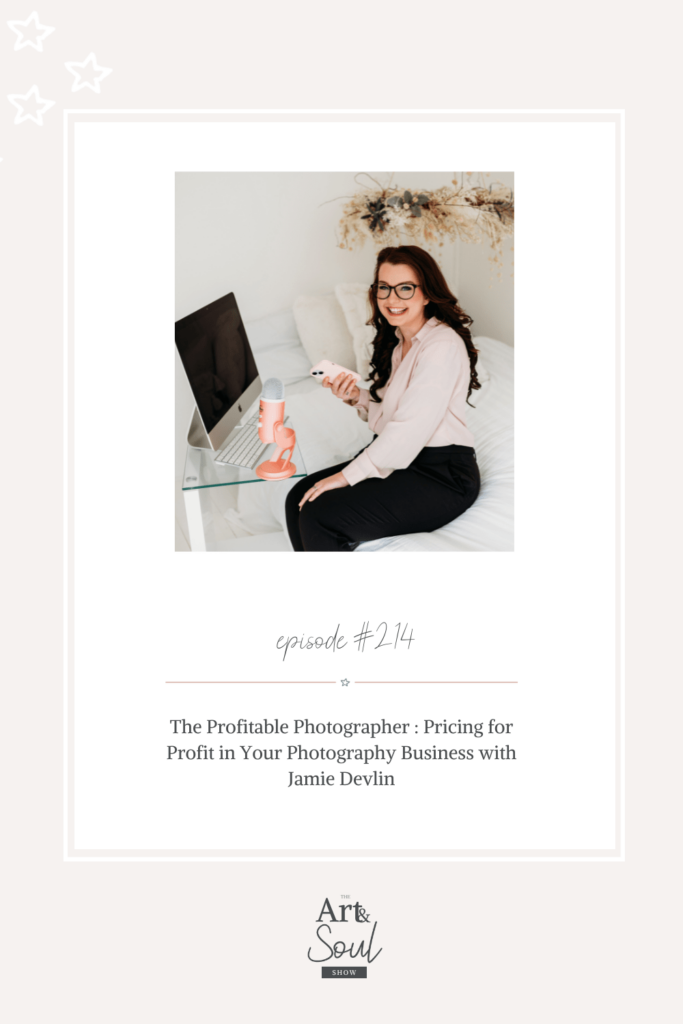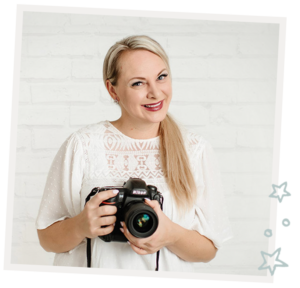The Profitable Photographer: Pricing for Profit in Your Photography Business with Jamie Devlin
Everywhere you look on the internet, you can find pricing guides, information, and others talking about the revenue their businesses generate. And that’s all fine and good, but at the end of the day, it doesn’t really matter when it comes to your individual business. What really matters is whether or not you’re pricing for profit in your business.

But “what about industry rates?” you may ask. Well, in today’s episode, my guest Jamie Devlin is here to remind us why we need to keep our eyes on our own paper and worry about what’s going to get us clients in our niche and make a profit in our own photography business.
She shares how she got started in the industry (and why she had to start making a profit right away), how marketing has changed in the photography industry in the last decade, and why it might be time to rethink the way you approach pricing.
She also walks us through finding our own unique “why” in our business and how uncovering that motivation can make your business run so much smoother. Let’s dive in!
What’s in this episode:
- [02:38] Jamie’s do or die start in the photography industry and how she’s pivoted since then
- [08:36] Why pricing is so specific to your unique business and why you shouldn’t read too much into others’ revenue numbers
- [12:01] How marketing in the photography industry has changed in the last decade and how Jamie finds clients currently
- [23:51] Why you need to find your “real why” before you can run your business authentically
- [28:28] Jamie’s advice for when you’re getting inquiries, but not closing sales
- [35:33] How to crunch your numbers and set your pricing to have a profitable business
- [42:54] How Jamie stays inspired in her business, even in the midst of her busy life
Tune in to this episode to learn how pricing for profit can transform your photography business.
SUBSCRIBE: Apple Podcasts | Spotify
Meet Jamie Devlin
Jamie has been in the photography industry for 13 years and has had her full time photography business for nearly 11. She now also helps those starting out in the photography industry, those who may be struggling with the marketing side of things and who feels they may need a refresher or boost of confidence in their business at her mentoring business, Shutterpreneurs.
Connect with Jamie
Follow Shutterpreneurs on Instagram
Follow Shutterpreneurs on Facebook
Visit Jamie’s photography website
Did this episode on pricing for profit help you rethink the way you run your photography business? Check out this episode Words of Wisdom: How Systems and Pricing Can Transform Your Business with Past Guests
Transcript
[00:00:00] Jamie Devlin: I have no desire to have a six figure business. Not really. I’m happy just paying my bills, my daughter goes to her classes, we go on vacation. I’m happy with that. And that’s my real why. So again, if I ever feel like, Oh, there’s someone out there, they’re doing so much better than me. It’s like, but do you actually want what they want?
[00:00:21] Or do you want what you want? And as long as you remember what you want, that’s how you’re going to be happy and content.
[00:00:30] Lisa DiGeso: Welcome to the Art and Soul Show, where we dive into heart opening chats on photography, business, life, and that messy in between. I’m your host, Lisa DiGeso, a mom, a photographer, and entrepreneur. And I’ll be sharing honest conversations and advice for photographers with insight on mindset, entrepreneurship, and creativity.
[00:00:52] The goal of this podcast is for you to be able to gain insights and strategies that will get you real results. Because let’s face it, [00:01:00] having a photography business can be lonely, but it doesn’t have to be. This is the place you can go when you need a boost of encouragement, a kick in the pants, and inspiration to pick up your camera.
[00:01:11] This is the Art and Soul Show. Hello, my beautiful friends. Welcome back to the show today. I am super excited to dive into today’s conversation with Jamie from Shutterpreneurs. She helps those starting out in the photography industry, those who may be struggling with the marketing side of things, and Those who might just need a refresher or a boost of confidence in their business, all at her mentoring business, shutter preneurs.
[00:01:37] I think we first came across her on Instagram and my team was like, Lisa, we need to get her on the show. So we reached out and I’m really excited to dive into today’s conversation. So welcome, Jamie.
[00:01:48] Jamie Devlin: Hello. Thank you so much. It is a pleasure to be invited on. This is my first podcast, so sorry if I’m a little bit iffy, but hopefully I’ll answer all your questions correctly.
[00:01:58] Lisa DiGeso: I love it. I’m sure you will. We’ll do fine. [00:02:00] So tell us who you are and what you’re really passionate about.
[00:02:04] Jamie Devlin: Okay, so I am a newborn and baby photographer, so I do have that business, first of all, and then I’m also passionate now about teaching other people with the market inside of their business, helping them out a little bit, and especially mums, because mums and businesses, it is hard work.
[00:02:22] So if I can help a mum really work hard and sort out her business. I’m really passionate about that.
[00:02:29] Lisa DiGeso: Yeah, I love that. I love that. So can you tell us a little bit about your journey in the photography industry and how you transitioned into mentoring others through Shutterpreneurs?
[00:02:38] Jamie Devlin: Yeah, so I have been in the industry 13 years now, so well over a decade.
[00:02:44] I originally started working in a studio in my local town, worked there for a few years, but unfortunately, me and the boss didn’t get on so well. I didn’t like the way things were run. So I kind of felt that I needed to leave that studio, but I loved what I was [00:03:00] doing so much. So I just kind of thought, you know what, I’m just going to set up and do this myself and give it a try.
[00:03:05] And I was only 21 at the time, so still really young. And I went all in, I got a commercial space, shop front straight away. There was no messing about, straight into it. And. Because I come from a pretty working class background, I didn’t have a load of money to go and put into this business. So I had to borrow the money because I had to do the shop up, had to buy all the equipment, the props, the camera, the lighting gear, absolutely everything.
[00:03:35] And also my parents, because I was young, had to be the guarantor of, of the property. So if I couldn’t afford the rent. Then they would have had to have paid for it. And I remember the day before I opened my business, I had seven pounds of 50 pence in my bank account by the time I had purchased everything.
[00:03:55] There was no option to fail. Like I had to do well straight [00:04:00] away. There was, you know, my parents had trusted me with them signing the guarantor contract. I had no money. So like, I didn’t have a couple of months rent upfront if I struggled, like I just had to do well, and I smashed my target first week, like, straight away, smashed it.
[00:04:17] But I think because I had nothing to fall back on, that pushed me to do well and to move forward because there was no option to fail. I’d signed the contract and I had to be there for at least one year. So I had 12 months of rent that I would have had to paid no matter what. And like I said, my mom and dad don’t have savings or at the time or anything like that.
[00:04:39] So they wouldn’t have been able to just pay for it for me. So it kind of started from there. Next month, I’ve been in business 11 years, so I must, must be doing something right. And maybe like two years ago, I kind of thought, maybe I should dabble into teaching. Because when you’re a business owner, [00:05:00] the only person who can give you a promotion is yourself.
[00:05:02] So when you get to like a certain point in your business and you’re like, I’ve done this for so long now, how can I move forward? So I thought about maybe I should start teaching. And then I started to see people on social media, really struggling with the market inside of things. I was seeing so many people saying, you know, I’m just going to close down, I’ve got no customers.
[00:05:22] And while I was reading and seeing this, I was sat there with a diary full of customers and I just thought if I can do it, especially someone who I’m not educated in photography, it’s all self taught. I don’t have a degree in business or marketing or anything like that. Like I said, I started when I was 21 and I just thought if.
[00:05:42] If I can do it, anybody can do it. So I just decided I’m going to help these people so that they don’t have to close their businesses.
[00:05:49] Lisa DiGeso: I love that. And I love that from the get go, you really had to treat it as a business because I think that’s something that we see in our industry is that, you know, you, we decide that we want to be photographers, but we don’t [00:06:00] actually look at crunching the numbers, what we need to be pricing in order to be profitable and that, you know, A little addiction that we all have as newborn photographers is spending far more than we make on our props.
[00:06:10] Jamie Devlin: Oh, gosh. And so I think that
[00:06:11] Lisa DiGeso: you didn’t even have that option because you’re like, hey, I need to be profitable. Otherwise my parents are going to lose, lose everything, right? They would not have been
[00:06:19] Jamie Devlin: happy. Yeah. They would not have been happy. And I also had to make enough money. To make sure I was paying the rent so that they didn’t, you know, have to pay it.
[00:06:27] But I also had this massive loan that I’d had to take in order to set the studio up in the first place. So I had two things that I had to make sure I was paying for, and then also my home bills as well. They needed to be paid. Yeah. So I needed to make sure, pay yourself that I was making enough and taking it seriously.
[00:06:44] Lisa DiGeso: Yeah, I love that. Now, where did you start right in going into like physical products as well?
[00:06:51] Jamie Devlin: So yes, mostly when I first started out, I was more print packages than digitals at the time. I mean, this is, like I said, 11 years [00:07:00] ago now, so things have definitely changed. So straight away, I was in there with your Print packages.
[00:07:07] I did IPS back then, straight away. I don’t actually do IPS now, which, because I have a child, I have a six year old, and I’m a busy mum, it’s just easier for me right now to do online galleries. But I did IPS then. Yeah, and I was selling prints, I was selling albums, I was selling canvases. Just kind of whatever they wanted at the time.
[00:07:27] Lisa DiGeso: And I love that you mentioned like, because of different seasons in our lives, we have the ability to change our business because I think that so many photographers feel that we, we get stuck. Like, for example, if you’ve always been someone who has done all digital or someone who has done like packages that you can’t ever shift and change based on your, the container you have and the time that you have available.
[00:07:49] But I love that you have made it work regardless of the season you’re in and you’re still continuing to thrive as a profitable business. Yeah.
[00:07:55] Jamie Devlin: Yeah. So. My daughter’s now six and before I had [00:08:00] her, everything was a lot different to what it is now. I was definitely working, you know, more full time hours.
[00:08:07] Whereas now it’s more, I don’t work part time. I work nearly full time, but it’s kind of like a little bit less because I’m a parent also. So you have to take into consideration what you have time for. So at the moment, I don’t have time to invite people back for the IPS. I have to do the online gallery.
[00:08:27] But again, when my daughter’s a little bit older, I might go back to IBS. So things can absolutely change depending on your life at the time.
[00:08:36] Lisa DiGeso: Yeah, I love that. That’s one thing that we really talk about a lot at the Milky Way is that there’s not one way. way to run a photography business. It’s what’s going to work for you.
[00:08:45] But I do think the most important thing is making sure that you’re profitable. I love that. So how did you figure out what you needed to make in these times to be profitable in order to pay all the bills and to pay yourself too?
[00:08:57] Jamie Devlin: So obviously that comes down [00:09:00] to pricing and Pricing is such a big topic.
[00:09:04] There’s so many opinions on pricing. You’ll always see people trying to tell people what they should charge and what they shouldn’t charge and all things like this. But pricing is so individual to that particular person. You have to price yourself so that you’re covering all your expenses, but then also making a wage on top of that.
[00:09:27] And I also think a lot of the time when it comes to pricing, people think More of their turnover, more than their profit. But turnover actually doesn’t mean a great deal. It’s what profit you’re making. Which, which matters. So there’s a lot of people out there who will maybe say, you know, I’ve got a six figure business, which is, is amazing, is great.
[00:09:49] And then people think, wow, they must be doing fantastic. But just because someone’s got a six figure business doesn’t mean they’ve got a six figure profit. And that is what we [00:10:00] need to remember as business people is we are in business. To make profit. So of course, when you are pricing yourself, you need to be pricing yourself on how much it’s costing you to run your business.
[00:10:14] And then also on top of that, how much do you want to earn as a wage for yourself? And I also, with some of my students, I’ve kind of given them example and shown them kind of like, they’re kind of made up, but like, say this is one photographers. pricing page for a cake smash shoot and they’re charging 300 pounds and then there’s another one and they’re charging 900 pounds.
[00:10:41] I said your brain automatically thinks that the person charging 900 pounds is making a lot more money but unless you know what their expenses are and their profits it’s not necessarily true and the 300 pounds photographer could actually be making more profit than the 900 pound photographer [00:11:00] so that’s why pricing is so Individual and personal to you, because you have to base it on your expenses and not other people’s expenses.
[00:11:10] Lisa DiGeso: I love that, that’s a great answer. So, what inspired you to focus on helping photographers with the marketing side of their business?
[00:11:18] Jamie Devlin: Okay, so, like I said, it got to a point in my business where I was like dabbling into teaching, should I, should I or shouldn’t I do this? And then I was constantly seeing people online really, really struggling saying, I’ve only got one booking for the whole of the month.
[00:11:36] And then I’ve probably got two more bookings for the rest of the year. Struggling to make ends meet. I’m working kind of paycheck to paycheck. And like I kind of already said to you, I was sitting there with. Bookings in my diary and just thinking, I really want to hug these people, like reach into the screen and say, you really don’t have to give up.
[00:11:55] You can, you can do it. And that is how the teaching kind of side then [00:12:00] came naturally to me.
[00:12:01] Lisa DiGeso: Yeah. I love that. So I want to talk about marketing strategies. What do you find is working right now? Because that’s something that we always hear in our groups. Yeah, sure. I’m not getting clients. I need clients, but I’m not getting
[00:12:13] Jamie Devlin: them.
[00:12:13] Okay. Okay. So. Things have changed over the years. Like I said, I have been in business for 11 years, industry, 13 years. And I don’t know if you’d call this a marketing strategy, but in 2024, the generation we’re in now, connection is such a big thing and connecting with your clients and potential clients is huge.
[00:12:38] When I first started out or a few years in. I niched down into being a baby and newborn specialist, and I always recommend niching down anyway, but as the years have gone on and the industry is more populated, there’s so many newborn and baby specialists now. You’re not standing out by [00:13:00] saying that. So, when you look at towns, um, I can only obviously speak for the United Kingdom, but because it’s such a populated industry, Several years ago, you may have had a town with one or two newborn specialists in, but now you’re probably looking at three or four.
[00:13:16] So it’s harder to stand out. And also I see a lot of websites that I look at for students and the first sentence on their website is, Award winning photographer, and of course, it’s great if you’ve gained awards, show it off completely. But everybody is saying the same thing now. Everybody is an award winning photographer as such.
[00:13:40] So we’ve really got to dive in and think, what can we do now to stand out? Because those things just aren’t, aren’t enough in 2024. So creating connection is such a good thing. So Like you, Lisa, when you said, you know, will you come on and [00:14:00] do this podcast with me? I thought, yeah, sure. And I feel, I felt really confident in coming because I felt like I know you because of the Milky Way, so it makes you then feel more approachable and comfortable with, with you.
[00:14:15] Whereas if someone else had said, Will you come on my podcast that I didn’t know anything about, maybe I would have been a bit more hesitant. So, if you can make people feel like they know who you are, And they connect with you and the things that you like, it’s going to make it easier to then gain their trust for them to then book with you.
[00:14:37] And also look at your target audience and the things that they like, post about things like that. So on my photography Instagram yesterday, I posted, like, this funny video about kids always going to the bathroom with you and you can never get rid of them. And my clients, people watching that video, will be like, Ha, yeah, I find that funny, if they’re my target audience.
[00:14:59] So [00:15:00] they can then, you know, have that connection with me. She likes the same kind of things. things as me and things like that. So I would say to people, don’t be afraid to show yourself in your business. People like to know who you are. It can be scary jumping onto Instagram stories and lives and things like that.
[00:15:18] But if you can, from a marketing perspective, at this point in life, I would say try your hardest. To be seen let people kind of know who you are and that should help with your booking.
[00:15:31] Lisa DiGeso: I love that It’s so funny because you’re right. I do do that with my Milky Way business But you know, what’s funny is I don’t with my photography business Really and I don’t I because I’ve been on a sabbatical for the past Almost a year and a half, and I’m going to start tiptoeing back into taking newborn clients in the fall.
[00:15:49] And I’ve had these like weird, like imposter syndrome or like, how do I start showing up again when I’ve been sort of vacant for so long? [00:16:00] So if I just, I think that’s so interesting because you’re right, cause I do, I have no issue showing up on Milky Way. It’s so easy. Yeah, absolutely. But when it comes to my photography business, I struggle with it.
[00:16:08] But
[00:16:09] Jamie Devlin: if people see you, they then have trust in you and it’s people that, people trust that they will buy from. So if there was, again, four or five different photographers that someone could choose from, say they were all for the same target audience, same pricing, did the same thing. The one that they’re going to pick out of the five is going to be the one that they trust.
[00:16:29] Yeah. Yeah.
[00:16:30] Lisa DiGeso: Yeah.
[00:16:31] Jamie Devlin: You can. Make people trust you by being there and being present. So, you know, do the behind the scenes, talk about you, talk about stories in your life, like if you had something happen with your birth, speak about it so people can connect with you. Of course, don’t make it a blog about yourself.
[00:16:48] It is still a business. But yeah, don’t be afraid to share those stories and then also repeat them because I feel like a lot of people Get afraid. Well, I’ve posted that already. I’ve already [00:17:00] said that story, but in a few months time, it might be completely different people in a new audience. on your socials, so why not share it again?
[00:17:10] Lisa DiGeso: Yeah, I love that. I think, you know, it’s funny. Is theI bump up against fear because I haven’t been posting on this Instagram for probably a good year and a half. Like I’ll sporadically post maybe once every four or five months. I’ll do a reel maybe once every four or five months. So I have this fear of like love bombing almost or like coming in too hot.
[00:17:32] And so I don’t, I think I, and it’s funny cause I’m like, how much should I be posting when I’ve been vacant for so long? So they’re not like, Oh my God, like too much girl. Like, you know what I mean? Yeah, absolutely.
[00:17:43] Jamie Devlin: And I think you just have to gradually go back into it and. Yeah. It’s like riding a bike, like you might have been out of it for a year and a half, but as soon as you start again, your passion will be there and it will just flow.
[00:17:57] Lisa DiGeso: Yeah. Okay. Well, I got [00:18:00] homework.
[00:18:03] I love it. So what are some effective marketing techniques beyond, I guess, showing up on social media for those that are just starting out?
[00:18:12] Jamie Devlin: Okay. So I say that people buy solutions. And they buy feeling so a lot of the time people are buying something because it helps them with something so for instance if you were organizing a big party you don’t know how to do it you hire a party planner you’re paying for someone to do that for you if you need to have your garden done but you’re no good at that kind of thing you hire someone who can do it for you so you need to be promoting yourself and how You can help them overcome these things and how you can solve their problems for them.
[00:18:49] So, for instance, say if you’re a maternity photographer, and, you know, we all don’t feel great when we’re pregnant, probably a lot of women will be thinking, do I really want to [00:19:00] go to this stranger? So, again, that’s when connection helps, because you don’t want them to think of you as a stranger. Do I really want to go?
[00:19:08] And then they see you posting stories about other people who have felt the same way, and And you’ve made them feel a million dollars. They’re going to think, well, actually, okay. Maybe there is someone out there who can solve my problem of me feeling uncomfortable and wanting, you know, to have this experience.
[00:19:27] Yeah. And then when it comes to selling feeling, the same kind of thing. So when I feel sad, I probably go and do some retail therapy because, not because I necessarily need these clothes, but it makes me feel a certain way. So people go have their eyebrows done and their eyelashes and things because it makes them feel good about themselves.
[00:19:50] They’re buying the feeling of So put that into your marketing, into your wording, when you’re posting, talk about how [00:20:00] seeing your newborn baby, having their photos taken, is going to make you feel how you’re going to feel in so many years. You know, when you’re looking back at those pictures, make sure you’re talking about these solutions and about the feeling.
[00:20:14] And then also super simple. It’s again, it’s not even a strategy, but. Being visible is huge. So I have a lot of students who will come to me and they’ll say, I’ve done a few Facebook posts. I’ve done a blog post and you know, no one is booking me. Have anyone actually seen these Facebook posts? Has anyone, you might be writing a blog every week, but is anyone reading that blog?
[00:20:42] If you are not visible, people don’t know you exist. And if they don’t know you exist, they can’t book you. And. I’m kind of like, well I like to say, I’m like the established newborn baby photographer in my area. And so I kind of always think that most people know [00:21:00] that I’m there. And I had a shoot, probably like two months ago, for a newborn session.
[00:21:04] And they came in, they have lived in my area, forever, and they had a three year old sibling. And I was saying, did you have photos of him? For their newborn shoe and they said, yeah, we went to this other photographer and I, I always do my market research within a shoe. I always kind of suss out. Yeah. How did you book me?
[00:21:24] Where did you find out about me? Because obviously that helps me market in the future. And they said that they didn’t know that I was there three years ago, but I’d been in business, what, eight years. Yeah. Then. So I, again, I look back and I think, well, I clearly wasn’t visible enough. Yeah. Even then, because they didn’t know I existed.
[00:21:46] So it’s just a huge reminder that if you are not visible enough, people cannot book you. So you can be doing all the right things. You could be priced accordingly to your target audience. You can have your pose in, [00:22:00] down to a tee. Every, you know, your customer service could be amazing. But if you’re not seen, people can’t book you.
[00:22:07] So always, always, when it comes to marketing, like I said, the biggest thing is to make sure you are out there and you are being seen. So one thing you can do is Network with local baby groups and anyone who’s, like, got the same target audience as you, that’s free advertising, you know. I contact baby groups and say, you know, Can you post a story on your Instagram for me and I’ll do the same for you for return?
[00:22:34] And it’s not even costing you anything, it’s completely free. And if a new baby, class, or something along that line says, Starts up in my area. I will always reach out to them, wish them the best just so they know I’m there and that we can, you know, eventually work together. I had a client come to me. She’s had a pictures with me for her two children.
[00:22:55] She’s just started a hypnobirthing class. She came in for some branding pictures. [00:23:00] So of course I said to her, right, let’s work together. Let’s, you know, share customers. And then she was like, yeah, sure. And she did her like little opening event. She then put all my vouchers in all her goodie bags and like, so just network.
[00:23:13] Don’t be afraid to talk to people. What’s the worst that can happen? They can say no, but
[00:23:18] Lisa DiGeso: they probably won’t. I love that years ago I did my shoot for our local NICU and all the nurses had had their babies at the same time. And so I had all the babies come in and we did, I think it was 10 buckets. So I did a composite of all the babies in a bucket and this great big image.
[00:23:37] And then I donated it to the NICU with my name on it. Right. And I can’t tell you how many sessions that I booked over the years because of that one thing I did. Because
[00:23:47] Jamie Devlin: you were then visible to those people. Yeah, sure. Yeah.
[00:23:51] Lisa DiGeso: Yeah. I agree. I think visibility and it’s funny because we think a lot of the time and we get scared that most of our business happens behind a screen and we forget [00:24:00] that we’re dealing with real people, you know, and, and real people hire people that they know, like and trust.
[00:24:05] And so you’re completely right is it was so important to build those relationships. I love that. So how do you encourage photographers to stay authentic to themselves and their vision in a competitive industry?
[00:24:18] Jamie Devlin: So when, again, when I train people, I always talk about something called your real why. And I say it’s your real why and not your why, because I say it’s different to the one that you probably tell your customers.
[00:24:32] So, um, yeah, A lot of us will say, I had a baby of my own. I took their pictures and then I decided I wanted to do this for other people. So this is kind of your why as to why you started out, but why are you in business? Why did you decide you wanted to take that to the next level as a business? And I, I tell them it’s because you want to make money, right?
[00:24:53] That, that is your why. That is why you are in business. It’s to make money. Otherwise it’s. You know, would be a [00:25:00] hobby. And then I say, so the main thing with your real why is to make money, but then everyone will have their individual why, when it comes to like how many hours they want to work. So someone might want to work once a week.
[00:25:15] Someone might want to do six days a week. How much money do you want to make? Someone might want to do a six figure business. Someone might just be happy just paying their bills at home. And that’s what they’re happy with. Like. Everyone has their own individual why, and it’s so hard not to get consumed by what everybody else is doing, what everybody else is charging.
[00:25:40] And I say, if you just always look back, if you’re ever having a bad day, you’re comparing yourself to others. You are seeing that, um, someone is, say, maybe fully booked, but you don’t actually know what they’re fully booked is. And you start questioning yourself, you get this imposter syndrome, just always knuckle down and think, well, actually, [00:26:00] what’s my real why?
[00:26:01] And if you are hitting that, then it doesn’t matter about what everybody else is doing. And I always say, I’ll be completely honest, I’m now a teacher, but I have no desire to have a six figure business. It’s not really, I’m happy, just Paying my bills, my daughter goes to her classes, we go on vacation. I’m happy with that.
[00:26:23] And that’s my real why. So again, if I ever feel like, Oh, there’s someone out there, they’re doing so much better than me. It’s like, but do you actually want what they want or do you want what you want? And as long as you remember what you want, that’s how you’re going to be happy and content.
[00:26:39] Lisa DiGeso: I love it. I think it’s so important because we’ve talked, I talk about this often on the podcast is understanding your definition of success.
[00:26:47] Absolutely. You know, it’s, it’s so personal what success is. Like if you ask someone, they’re like, you’re going to say it’s a seven figure business or a six figure business. And some people are going to say, you know, it’s time with my family. It’s weekends [00:27:00] off. So you really have to like dig in to understand what your motivation is for success and what your definition is.
[00:27:07] I love that. Such a, such a good answer. Have you heard about the seven layers of why?
[00:27:12] Jamie Devlin: I don’t think I have.
[00:27:13] Lisa DiGeso: Okay. So I, this was something I’ve, gosh, I can’t even remember who it was or what book it was. I read, but it was like, your real why is actually seven layers down. So if you’re like, okay, well, why do you do that?
[00:27:24] And you’re like, because I love babies. You go, why? And it’s like, well, because I struggled to get pregnant. And. Why? Well, you know, this, this, and then you go seven layer, and so why is it important to you? And it’s like, well, I had such a hard time being a mom. I want these memories to be preserved for this family forever.
[00:27:40] And it’s why? Why? Until you get to like the deepest why, it makes you cry.
[00:27:46] Jamie Devlin: Oh.
[00:27:46] Lisa DiGeso: And then you’re just like, okay, well that’s my why. I was about to
[00:27:50] Jamie Devlin: say, I’m going to look that up after this, but now you’re telling me I’m going to cry. I’m like, is that a good idea?
[00:27:54] Lisa DiGeso: Yeah. It’s called the seven layers of why. And it’s like just a technique to just go down to really get to [00:28:00] the heart of the matter.
[00:28:01] And I think it’s really a fascinating thing when you started talking about why I was like, cause you can always dig a little bit deeper, right?
[00:28:07] Jamie Devlin: It’s just so important to remember what your why is because if you start comparing yourself to others all the time, you’re just going to fall down this. Dark hole of depression and you just need to remember why you’re in business, what makes you happy and why you’re doing it.
[00:28:24] And as long as that is working for you, that is all that matters.
[00:28:28] Lisa DiGeso: I love it. Love it. So one thing we often hear is I’m getting inquiries, but I’m not getting bookings. Can you maybe share what might be breaking down there and how to convert more of those inquiries into sales?
[00:28:40] Jamie Devlin: Sure. So there could be a couple of reasons for this.
[00:28:44] Firstly, I would look at who you’re targeting because it could be a target audience problem. So for instance, you’re having people contact you, they’re asking for your prices, you’re saying you’re pricing and then they just can’t [00:29:00] afford you. So that of course just means that’s not your target market, right?
[00:29:04] And I would always say don’t take that as a negative, take it as a positive because They’re showing interest, they like what you’re offering, they like your photos, they just can’t afford you. And, yeah, you’ll have some people who may be interested in, say, like, a payment plan, or they’ll pay on their credit card, or something like that.
[00:29:26] But if it’s way, way, way out of their price range, they’re just not gonna book because they can’t afford you. They could think you are the most amazing photographer in the world, they can totally think you’re worth it. But they can’t afford you. It’s literally down to that. So I would look at that and see who you’re targeting to.
[00:29:43] And then also, if it’s not a targeting problem, maybe you’re getting the correct target audience, look at, I’d say try not to look at who’s around you, but If there are, say, three or four photographers around you who are doing the same thing as you and [00:30:00] you are all targeting the same target audience, you need to look at how you can stand out because if that’s the same target audience and you’re priced the same, well, that person’s then got four different photographers to choose from.
[00:30:13] What’s going to make you different? So it could just be looking at what you can offer that’s different to the other ones. And again, that whole connection thing and how People remember how you make them feel. So if I was to get a response, say I was someone and I was looking at two different photographers, they were the same price range.
[00:30:33] They did the exact same thing and someone, and I asked them both for their pricing and I said to some, one of them replied, hi, good afternoon. Here’s my pricing. And then somebody else replied. Hi, huge congratulations on your pregnancy. How is that going for you? Do you know if you’re having a boy or a girl?
[00:30:53] And they like try to get to know you. Who am I gonna book? I’m gonna book the person who [00:31:00] made me feel good and that I feel comfortable with. So yeah, I would look at target audience. Are you targeting to the correct person or what can you do that’s gonna make you stand out from the others? around.
[00:31:14] Lisa DiGeso: What I often hear too is that, so I’m doing all those things, but I’m also the most expensive photographer.
[00:31:20] Yeah. So, and like, and you know, and I’m not saying just me, I’m saying, um, our students, we hear this a lot in our groups that, you know, I’m, I want to charge what I need to charge to be profitable and to pay myself. But there’s five other photographers down the block that are. Charging a third of what I charge and have equally or better skills.
[00:31:39] So what do I do in a situation like that? It
[00:31:41] Jamie Devlin: is literally simple. You need to stand out from the crowd. Like, there’s no, I hate to say it, but again, I’m, I’m the teacher who’s completely honest. I will never say to people, book me and I’m going to get you. 1000 bookings, like there is, I’ve, like I said, been in this industry for 13 years.
[00:31:59] There is no [00:32:00] magical formula. It’s just not there. And if you know, if someone disagrees with me, please let me know. Let me know this magical formula that is going to get you bookings through the door. Like, There isn’t. You really do have to just stand out from, from the crowd. That’s, that’s all you can do.
[00:32:17] And educate your clients as to why they’re paying more for you. So if, like you said, there’s people who are the same skill level as you, okay, well, what makes you better? Why is it worth It’s me paying this money and it’s, it’s, it’s hard. Like I said, I’m, I’m not going to lie, but that, that is the truth about it.
[00:32:38] You’ve just got to stand out, make the connection and kind of go from there. Like I also see a lot of people in groups and things saying, I wish these people wouldn’t charge so much less than me because it’s stopping me from getting customers. But in reality, that’s not their problem. Like your business is your problem.
[00:32:59] If they’re [00:33:00] happy with their pricing. That shouldn’t affect, that shouldn’t really affect you. No. It’s a you issue. And I, I mean that with love. I don’t mean that in a horrible, disrespectful way. If you want to earn more, you need to be working hard to earn more. Does that make sense?
[00:33:17] Lisa DiGeso: Yep. A hundred percent.
[00:33:18] And, and the fact of the matter is if the other photographer down the block is completely booked out and you’re not, well, who they’re going to look at next? Yeah, sure. We can’t, this is the thing as well. Like
[00:33:31] Jamie Devlin: everyone gets so like. Oh, they’re my competition. They’re my competition, but. You can’t physically photograph every single baby, like, so you should, you know, again, see everything as a positive, because I also feel that when you get what you give out to the world, and I don’t necessarily mean the law of attraction, but some people believe it’s the law of attraction, I’m not saying it isn’t, but.
[00:33:57] If you are in a negative mood, [00:34:00] you sit there, you are having a little rant that no one is booking you, you’re, your head’s not in the game. You’re then gonna not put the work in, you’re not gonna be marketing, and then you’re not gonna get the clients. Whereas if you try and remain positive as much as you can, you wake up in the morning and you think, Do you know what?
[00:34:20] I’m gonna do this, I’m gonna get those bookings today. You’re more likely to get those bookings. Because without realizing it, you are then actually putting the work
[00:34:28] Lisa DiGeso: in. Yep, 100%. I love that. And I think what’s important is building those relationships with your local, I’m going to put in quotey fingers, competition.
[00:34:39] Because it’s so important. Like, what happens if you get sick? What happens if you decide that you need some time off? Like, being able to refer to local, Photographers is incredible. It’s been so handy for me. I’ve got friends at the yin yang. I love it. I love it. I do it all the time. It doesn’t put that pressure, right?
[00:34:58] If you’re like, you know what, I’m,
[00:34:59] Jamie Devlin: yeah. [00:35:00] Like tries to book me and I’m fully booked. I then refer the other photographers. I’ve got no problem with sharing. Like just be positive. Just be happy for everyone.
[00:35:11] Lisa DiGeso: Yeah, there’s enough for everybody to go around. Absolutely. I believe that too. I love that. So I know that we’ve talked a little bit on pricing.
[00:35:19] So, but for many new photographers, when they do is they look at the photographer down the block and what they’re doing when it comes to their pricing and then they just park and they stay there. So can you maybe share your advice on how you can get away from that and advice on pricing yourself to create that profit?
[00:35:33] Jamie Devlin: Yeah. So literally, like I was saying earlier, everyone’s pricing is completely personal and for you to make sure that you’re making a profit, you need to know your numbers. You, you need to know, a lot of people don’t even know how much money they’re making per shoot. And that’s crazy to me because it’s like, how do you know if you’re making profit, if you, if you don’t know how much money you’re making by doing that photo shoot in the first place.
[00:35:59] So yeah, [00:36:00] knuckle down, make sure you know your exact expenses, literally down to the T. So even something, I don’t know what you use, but for my galleries I use Shootproof. I mean, it’s probably 40 a year or something like that, but I still put that in every single session Because it’s an expense and I want to know exactly What i’m what i’m making and like I said earlier always remember if you were looking at Someone else down the street and then you’re pricing based on them You’re pricing based on their expenses and not on your expenses.
[00:36:36] You’re pricing on how much they want to earn, not how much you want to earn. So yeah, just, I would say that’s the worst thing you could do is look at somebody else’s prices and price yourself on them. And the scary thing is I see a lot of photographers who. Again, ones that I’ve teached or have done my boot camp or things like that.
[00:36:54] And I go on their websites and their pricing structure and their pricing is the exact same. And [00:37:00] I’m like, but you all have different expenses. How, how can you possibly have the exact, exact same pricing? That just, it just doesn’t make sense to me personally. You really need to work out. Your expenses and how much you want to charge
[00:37:15] Lisa DiGeso: and you have to re evaluate it too And I think that’s the one thing is photographers often think I crunched the numbers once and they’re done And then they all are getting these like additional fees or prices for Adobe Photoshop go up or additional things Yeah, you need to add that all in.
[00:37:30] Yeah, right? Yeah. Mm-Hmm. Good conversation. So, let’s see. Can you share some strategies for overcoming the negative effects of social media on mental health and business operations?
[00:37:42] Jamie Devlin: Yeah, so again, I dunno what it’s like in Canada, but in the UK the help for mental health isn’t that great. Like it’s, it’s getting better, but mental health is so many different things, and you can have bad mental health within work.
[00:37:58] And again, one [00:38:00] of the reasons why I decided to start teaching was because I was seeing all these people really down in the dumps saying they’re just going to throw in the towel. I just can’t do this anymore. And that’s, like I said, I wanted to reach and give them a hug and tell them it’s okay. And I feel that when I first started in the industry or when I first started my business, There wasn’t much about online.
[00:38:24] There wasn’t all these Facebook groups and things like that. Like Creative Live was like starting then. And then I think I did your newborn retreat. I think it was like 2017 or something like that. So maybe like four years into my business or something. But it wasn’t such a social media thing. And if you wanted to learn something, you just had to Google it and things like that.
[00:38:46] And all these groups have come about. They’re amazing. You make friends, you can ask questions and advice, but sometimes they can be quite negative when there’s a lot of [00:39:00] opinions that are floating around. And that’s again, why I always say, Remember your real why so someone might have an opinion try not to take that to heart like if if they are being a bit Nasty with it say Remember your real why because I was also I was seeing comments of like someone talking about her pricing And what she said kind of blew my mind.
[00:39:22] She said, she kind of felt like her target audience was changing. She wanted to lower her pricing. The reason she wouldn’t lower her pricing was because she was too scared of what other photographers would think of her. And she was too scared that that would make them angry. And it was just like, in the nicest possible way.
[00:39:41] Yes, we are an industry. We want to be the best industry we can be. But, You’re probably never going to meet these people in your entire life. Like what your business is and their business are two completely things. And it just blew my mind that she was more concerned about these people that she’d never met than her actual business, if that [00:40:00] made sense.
[00:40:01] And like, that really touched me. And I just, again, just wanted to like say, no, it’s okay to do whatever you need to do in your business. And so yeah, there is just so many opinions out there and I think if you are finding yourself constantly comparing yourself to others, constantly doubting yourself, are this person’s pictures are better than mine, this person’s got more bookings than me, remind yourself that you can actually come out of these groups.
[00:40:31] There’s still going to be that. I’ve actually done it a couple of times when I found myself like in these groups, All the time, like I’d be in the bath and I’d just be scrolling these groups all my free time, just constant photography. And I’m like, when things got too much, I’ll just, you know what, remove, have a break and then you can always go back if that makes sense.
[00:40:54] Lisa DiGeso: Yeah, totally. You know, it’s funny because I always like to play this game and I have to catch myself is I [00:41:00] always like to compare someone’s amazing, polished, beautiful image. And then I look at the back of my camera and it doesn’t look the same. Yeah. And I’m like, because you’re comparing apples and oranges to give, right?
[00:41:13] Yeah, yeah, sure. Absolutely. Right? Like,
[00:41:16] Jamie Devlin: it’s completely different. Because there are pictures, we will have self doubt and be like, oh, this is so bad. But actually the clients love it. Like they love it. They love it. It’s a picture of their baby and they’re like, oh my gosh, it’s the cutest thing ever. So as long as your customers are happy.
[00:41:33] Great, like you’re making the money,
[00:41:34] Lisa DiGeso: which is why you’re in business in the first place. And it’s so funny, it’s like you have to remind yourself quite often, who am I shooting for? Especially when you’re posting things on social media, because there’s been so many times that there have been images that are absolutely beautiful.
[00:41:49] But I have like, Curled up fingers. Yeah. Like a mushy cheek. Yeah. And like in the photography world, we’re like, no. Yeah. That’s horrible, right? But to someone, [00:42:00] they don’t see that. And so you have to
[00:42:01] Jamie Devlin: literally do not see what we see. I mean, I look back at photos that I was taking 11 years ago and I think, oh my gosh, like what on earth was I doing?
[00:42:11] That’s so bad. But at the time the customer purchased all the images and they loved them.
[00:42:18] Lisa DiGeso: And, you know, I started around the same time and wow, like the industry, the newborn photography industry and the standard of posing has changed so radically since when we first begun back in, cause I was 2010 as well.
[00:42:31] And there were only a few big names back then that were teaching. And if you look back at their work too, you’re just like, wow, like, It has changed so much to the standard that we are expecting of ourselves. Yeah, completely. And the funny thing is like, those images are, are beautiful, right?
[00:42:50] Jamie Devlin: Yeah. As long as your customer is happy, that that’s all that matters.
[00:42:54] Lisa DiGeso: So, balancing your business brain and your artist brain can be super tricky. [00:43:00] So, can you share any advice you have on being a savvy businesswoman, but also carving out that time to be an inspired artist?
[00:43:06] Jamie Devlin: Yeah, so, I would say, if you can, I know this won’t, you know, if you’re a mom and things like that, it can be difficult, try your hardest to give yourself working hours and stick to them, because If you’re someone who works from home, again, this is probably more of a female mind, but you’ll be like, I’ll just get the vacuum out.
[00:43:28] I’ll just do this. I’ll just take the dog for a walk. I’ll just put the washing on. And if you were in a job where you were working for someone, I couldn’t say, I’m just going to go home for 10 minutes and pop that wash on. Like you wouldn’t be able to do that. And I feel that a lot of, you know, Burnout comes from the fact that we’re not actually sitting and doing the work in work hours.
[00:43:50] So if you’re distracted and you’re doing other things, of course you’re then going to have to work in the evenings because you’ve not done it in the day. But if you actually sat [00:44:00] and, you know what I mean, did it in those hours, you’d be good to go. And I would also say, Don’t try and do more than you can chew.
[00:44:10] So a lot of people will probably try and do full time hours in part time hours, and it is just not good. So like me now with my shutterpreneurs, that is a lot fresher and newer than my actual photography business. And when I’m working on that, I have to remind myself, okay, Jamie, you can put the time and effort into it, but you still have this other business.
[00:44:32] You cannot physically work full time on both businesses. Because that is when you are going to completely burn out and your health is just going to I did that. Yeah. So unfortunately, September last year, I was hosting my boot camp. And again, I was like, yeah, I can get all these videos out and All of that around my normal photography business, and sadly my mum passed away.
[00:44:58] So I had a lot of [00:45:00] like, grief with that, and probably the most sensible thing would have been to postpone it, and I’m sure people would have understood, but I have this brain of don’t let people down, come on, you’ve signed up for this. You’re going to do it. And then I found myself, my mum had just passed.
[00:45:18] I was trying to run this photography business. Of course I had some time off because she passed and then I was drowning in shoots because I had to reschedule them as well as the shoots I already booked. And then I was trying to do these videos for my bootcamp students as well. And my health was just terrible because I was just trying to do way too much than I could.
[00:45:42] And again, it kind of shows that you can’t believe everything you see on social media because my bootcamp students would not have been aware that I was feeling like this. They were just like, yeah, she’s, she’s got the videos out. Like, thank you so much. They wouldn’t have been aware that in the background I was actually a big mess.
[00:45:59] So [00:46:00] I think that is kind of a lesson learned from Ben actually for me to say, take time off, stick to your hours and just remember that unless you’re a business and you’ve got staff. There is only one of you and you can only go so far.
[00:46:18] Lisa DiGeso: Oh, well, I’m so sorry for your loss, Jamie. That’s so tough. I completely agree with the scheduling work hours.
[00:46:27] My life changed when I said I don’t work on weekends and I don’t like edit or work in the evenings. As soon as I started scheduling that editing time in that time, it was gone. Magic, it was just magic because then I know when I booked a session, this is the only window that I have for editing certain amount of sessions in the week.
[00:46:46] So you have to get it done, right? Yeah. I can’t overbook myself because these are my parameters, right?
[00:46:51] Jamie Devlin: And I feel like a lot of people get scared to be strict with their rules. So, yeah. You know, they might have [00:47:00] certain opening hours and then a client says, but I can’t do this. I can only do that. And it’s so easy for them to say, do you know what I’ll, I’ll do what you want me to do because they’re scared of losing that client.
[00:47:10] And I do get it. Like I’ve been there in the past, especially if you’re first like setting up, but you also have to remember that you are a business and you aren’t open 24 seven. You, you do need a break. So if someone says to you, I can only do this date. And you are not scheduled to work on that date, just say, just say no, like you, you have to.
[00:47:31] Lisa DiGeso: Yeah, a hundred percent. I love it. All right. So you ready to switch to our lightning round? Go for it. Okay. If you like to cook, what do you like to cook the most?
[00:47:41] Jamie Devlin: I’m not much for cook. So maybe something really simple, like sausages and mashed potato or something like
[00:47:50] Lisa DiGeso: that.
[00:47:51] Jamie Devlin: What’s your favorite movie?
[00:47:52] Lisa DiGeso: Titanic. Ooh, good one. What did you want to be when you were a kid, when you grew up? A teacher. Ah. [00:48:00] Favorite guilty or not so guilty pleasure?
[00:48:06] Jamie Devlin: Oh gosh, that’s a hard one. I don’t know, I’ll have to skip that one, I’ll have to skip that one. Oceans or mountains
[00:48:13] Lisa DiGeso: and why?
[00:48:14] Jamie Devlin: Okay,
[00:48:14] Lisa DiGeso: I’d say oceans just because I live by the sea. Mm, yeah, I love the ocean too. What is something you’ve accomplished as an adult that your younger self would be proud of? I know everybody
[00:48:26] Jamie Devlin: probably says this answer, but of course running a successful business.
[00:48:29] I was always that child who was trying to make money, so like even in middle school I was like making magazines and like selling them to my friends and things like that. I was a kid who at the front of the house was trying to sell her old toys to make some money. I was always, I don’t know where I get it from, like there’s no business people in my family at all, just me.
[00:48:50] But yeah, as a kid growing up I was always. Trying to make money somehow. So I think as I got older, that just kind of happened. .
[00:48:58] Lisa DiGeso: I love that. I love that. [00:49:00] Where do you feel most centered and happy with my family. I love that. What advice do you have for someone just starting out?
[00:49:10] Jamie Devlin: So I would say the same advice I once heard, and I wish I knew where I found the saying from, so I could thank them.
[00:49:18] But someone once said, your business is your business and somebody else’s business is none of your business. Yeah. I don’t remember where I heard that from, but it must have been some trainer or something like that. And it’s always kind of stuck with me. So I, I would definitely give that as advice.
[00:49:37] Lisa DiGeso: I love that.
[00:49:39] So where could our listeners learn more from you?
[00:49:41] Jamie Devlin: Okay. So I have my Shutterpreneurs Instagram, so just Shutterpreneurs and there’s plenty of, I post. You know, advice and tips on marketing and business. And then I’m also working on my elevator course at the moment, which is aimed at people wanting help with their [00:50:00] marketing and their business is kind of, it’s live at the minute, but it’s only live to certain people, like they’re sussing it out, you know, see if there’s anything I need to change and get the testimonials and some things like that.
[00:50:13] But if you go to Shutterpreneurs. com, you can sign up for the, like the pre live price of joining in. So, yeah. Have a look on there.
[00:50:21] Lisa DiGeso: I love that. So I’d love to end my interviews just with this last question and it is, what are you currently curious about or artistically curious about?
[00:50:30] Jamie Devlin: Something really random actually and I would say AI because in the last year there’s been so many people trying it out and I’ve still not tried it out.
[00:50:39] I’ve still not gone on to Photoshop and actually, really. Um, I feel like I haven’t updated my Photoshop for years and years, so it’s actually not on my Photoshop right now. But yeah, I’m definitely curious to see as
[00:50:52] Lisa DiGeso: to what you can do with that. Oh, I love it. I, I’m a fine art compositor and I love to do that in my spare time.
[00:50:58] And what I like to do is actually [00:51:00] self portraits. Yeah. So I actually just did one where I made the background and it’s a great Gatsby, like 1920s style. And Photoshop myself in there in like full on 1920s outfit. It’s. It was so fun. I just love playing with AI.
[00:51:15] Jamie Devlin: Yeah, I definitely need to try it out at some point.
[00:51:18] Lisa DiGeso: It’s so cool. Well, Jamie, thank you so much for joining me today.
[00:51:22] Jamie Devlin: No, thank you. It’s a pleasure.
[00:51:23] Lisa DiGeso: Thank you for inviting me. Oh, my beautiful friends. I hope you have loved this conversation just as much as I have. I am sending you so much of my light and my love today and every single day. We’ll see you next time.
[00:51:41] I wanted to take a moment to ask you a little favor. I so appreciate you spending your time with me and tuning in and listening to the show. I would be so incredibly grateful if you could take a quick moment to leave a review on Apple Podcasts. Your review helps other photographers discover the podcast and learn how to [00:52:00] grow their own photography businesses and gain confidence to go after their dreams.
[00:52:05] It also means the world to me personally. and helps me know what content you find most helpful. Thank you so much for your support and for being part of our amazing community.
share the love
[Sassy_Social_Share]
recent
Podcasts

I'm
Lisa DiGeso
I’m on a mission to create uplifting online experiences for photographers ready to elevate their art, their business and their mindset.(...and have fun along the way!)
























